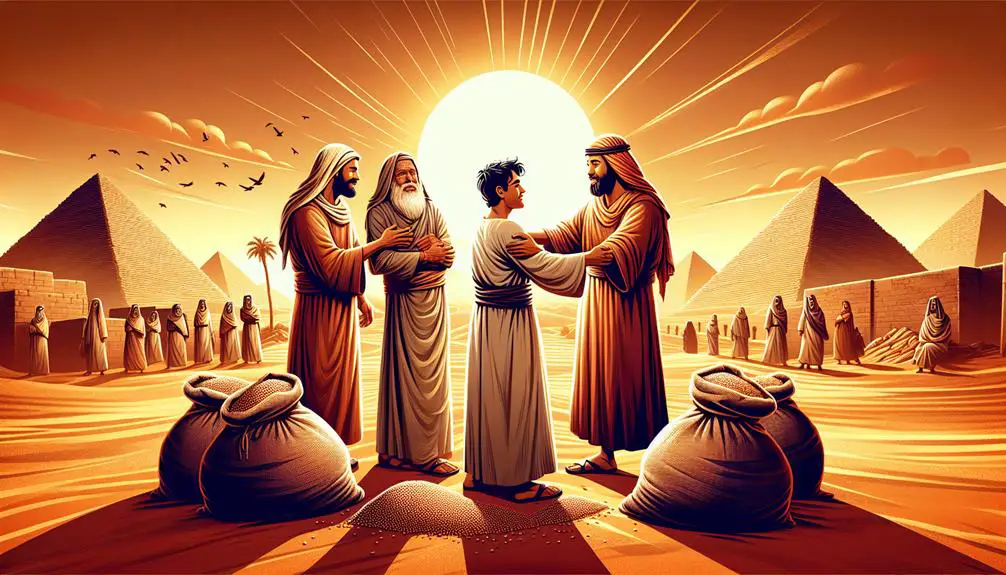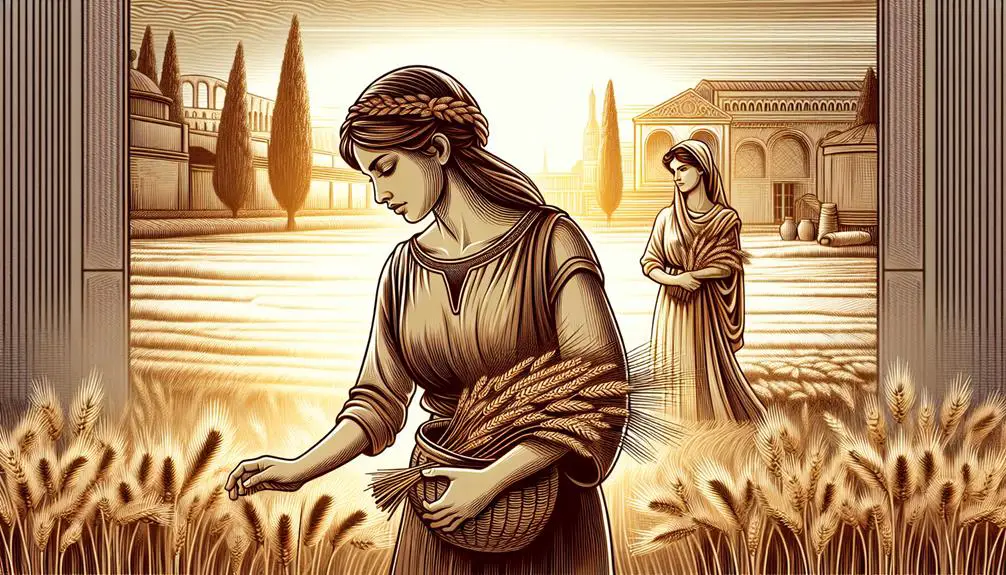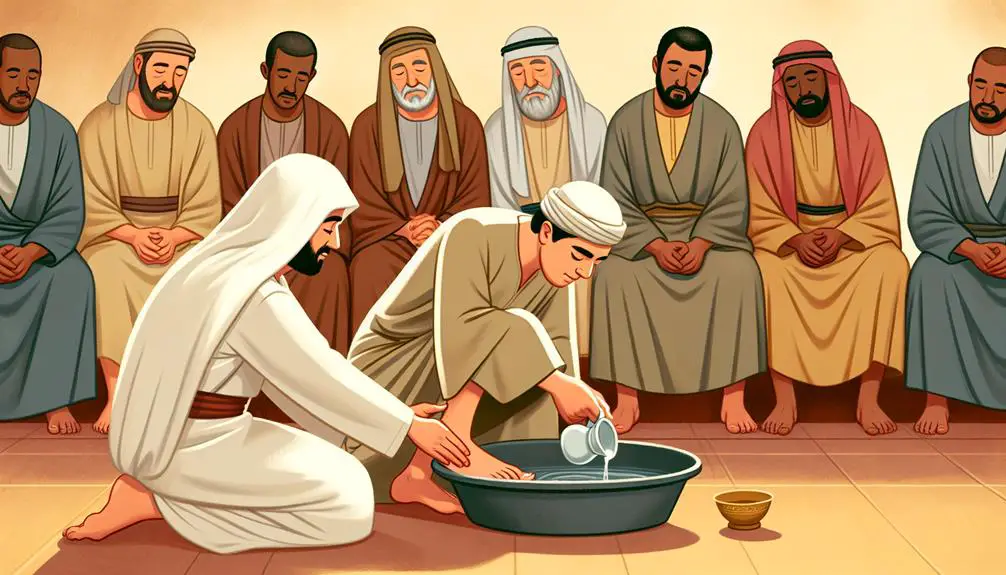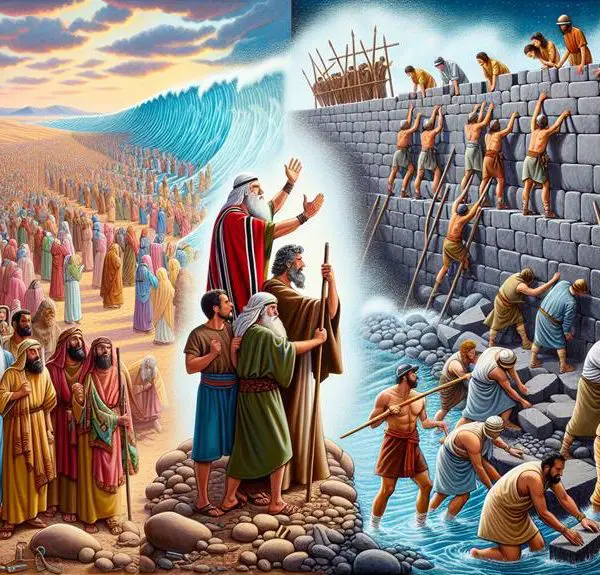Meet the biblical figures who mastered the art of selflessness, and discover how their stories can inspire your own acts of kindness.

Examples of Selflessness in the Bible
In a world where the phrase 'every man for himself' seems to be the unofficial motto, the Bible stands out like a sore thumb, brimming with tales of selflessness that could make even the most self-centered among us pause.
From Abraham's ultimate test of faith to the Good Samaritan's act of kindness, these stories aren't just ancient history. They're lessons in putting others before yourself, wrapped in narratives that have stood the test of time.
You'll find yourself intrigued by the depth of sacrifice displayed, and perhaps even inspired to reflect on your own acts of selflessness. So, why not embark on a journey through these tales? The insights you'll gain about selflessness and sacrifice might just surprise you.
Key Takeaways
- Biblical figures like Abraham and Esther demonstrate selflessness through acts of sacrificial faith and courage.
- Parables such as the Good Samaritan teach the importance of compassion and inclusivity across societal divides.
- Acts like Jesus washing the disciples' feet redefine leadership with humility and servant-hearted love.
- Stories including the Widow's Offering highlight that true generosity comes from the heart, not material wealth.
Abraham's Ultimate Test

Abraham's ultimate test of faith, as recounted in the Bible, exemplifies a profound moment of selflessness and obedience to divine will. This narrative, deeply embedded within the scriptural tradition, showcases sacrificial faith and the rigorous testing of obedience. You're invited to analyze the layers of meaning behind Abraham's willingness to sacrifice his son, Isaac, an act halted by divine intervention. This story isn't merely about the act itself but the unwavering trust in God's command.
The concept of obedience testing in this context is multifaceted. You see, Abraham's readiness to comply without question underscores a surrender to a higher purpose beyond personal loss or gain. It's a testament to faith transcending understanding, where the moral and ethical implications of his actions are secondary to the fulfillment of divine command.
Moreover, sacrificial faith, as demonstrated by Abraham, isn't a blind leap but a conscious, deliberate choice rooted in deep conviction. This story serves as a cornerstone for discussions on faith's nature, challenging you to consider the extent and limits of spiritual obedience. Through Abraham's trial, you're encouraged to reflect on the essence of true selflessness—sacrifice without expectation of reward, solely for the sake of adherence to one's faith and values.
Joseph Forgives His Brothers

In the biblical narrative of Joseph and his brothers, the act of forgiveness emerges as a pivotal demonstration of selflessness and reconciliation. After enduring betrayal and suffering at the hands of his siblings, Joseph's decision to forgive them underscores a profound message of family reconciliation and the power of grace.
Consider these aspects of Joseph's story:
- Family Reconciliation: Joseph's forgiveness of his brothers facilitates a heartwarming reunion, highlighting the importance of family bonds and reconciliation, even after profound betrayal.
- Dream Interpretation: Joseph's ability to interpret dreams, which eventually elevates him to a position of power in Egypt, plays a crucial role in saving his family from famine, demonstrating how personal gifts can serve others.
- Emotional Maturity: Joseph's journey from a young, naive boy to a wise, forgiving leader showcases the importance of emotional growth and understanding in overcoming personal vendettas.
- Strategic Forgiveness: Joseph tests his brothers' integrity before revealing his identity, ensuring they've changed. This strategic approach to forgiveness illustrates the balance between wisdom and grace.
Joseph's story teaches that forgiveness isn't just an emotional release but a strategic decision that can lead to healing, restoration, and unforeseen blessings within the family.
Ruth's Loyalty to Naomi

Similarly, the story of Ruth exemplifies another profound dimension of selflessness through her unwavering loyalty to Naomi. You'll find that Ruth's migration to a foreign land alongside Naomi wasn't merely a physical journey but a testament to her selfless commitment. Under Naomi's guidance, Ruth transcends cultural and personal barriers, showcasing a loyalty that is rare and commendable.
Aspect |
Ruth's Actions |
Lesson |
|---|---|---|
Loyalty |
Staying with Naomi |
Unconditional support |
Sacrifice |
Leaving her homeland |
Personal cost |
Obedience |
Following Naomi's advice |
Trusting guidance |
Hard Work |
Gleaning in fields |
Providing for family |
Faith |
Adopting Naomi's God |
Spiritual commitment |
Analyzing Ruth's journey, you're invited to consider the depth of her sacrifice and the strength of her character. Her actions under Naomi's guidance not only ensured their survival but also positioned her within a narrative of redemption and divine providence. Ruth's story is not just about migration or loyalty; it's a narrative that challenges you to reflect on the essence of selflessness and the impact of unwavering dedication to another's wellbeing.
Moses: Leader and Servant

You'll find Moses' leadership style to be uniquely humble as he guided the Israelites through their trials. His actions reflect a deep commitment to serving others before himself, setting a profound example of selflessness in biblical history.
This analysis will explore how his role as both leader and servant underscores the complex nature of his character.
Moses' Humble Leadership
Moses exemplifies the quintessence of humble leadership, serving both as a formidable leader and a devoted servant to his people. His journey from the burning bush to the plague negotiations with Pharaoh showcases his unwavering commitment and humility. Moses' leadership is characterized by:
- Reluctance to Lead: Initially hesitant, his humility shines through his reluctance at the burning bush, underscoring his selfless nature.
- Effective Communication: Skilfully negotiating plagues with Pharaoh, demonstrating strategic and compassionate communication.
- Moral Integrity: Moses' choices reflect a deep moral compass, prioritizing the welfare of his people over personal gain.
- Empathetic Leadership: Exhibiting empathy towards the struggles of his people, Moses stands as a symbol of selfless leadership, guiding through actions embedded in humility and service.
Guiding the Israelites
Building upon his humble leadership, guiding the Israelites through their desert journey further illustrates Moses' role as both a leader and a servant.
The narrative of the desert wanderings serves as a testament to Moses' selflessness and dedication. He navigates the challenges of leading a nascent nation, often interceding on their behalf with God and tirelessly working to keep their faith and morale high.
The journey towards the Promised Land was fraught with trials, yet Moses' steadfast commitment never wavered. His actions during this period underscore a profound sense of duty and service, highlighting his understanding of leadership as an act of selfless service rather than a position of power.
Moses' guidance during the desert wanderings exemplifies his unwavering dedication to God's will and his people's welfare.
Esther's Courageous Sacrifice

Facing potential death, Esther's decision to intercede on behalf of her people exemplifies a profound act of selfless courage, underscoring the thematic significance of sacrifice within biblical narratives. Her story isn't just a tale of personal bravery but also a strategic maneuver within the confines of royal power dynamics. Esther's approach, marked by royal risk and festive strategy, highlights the complexity and danger inherent in her mission to save her people from genocide.
To understand the depth of Esther's sacrifice, consider the following points:
- Royal risk: Approaching the king without being summoned could have resulted in her death, yet Esther chose to face this danger.
- Festive strategy: She wisely used the context of a banquet to present her plea, showing tactical patience and understanding of royal customs.
- Cultural defiance: Esther's actions broke the norms expected of women and queens in her time, marking her as a figure of both defiance and inspiration.
- Spiritual faith: Her faith in God's deliverance was a key aspect of her courage, guiding her actions despite the uncertain outcomes.
Esther's story serves as a powerful example of selflessness, where personal sacrifice is made for the greater good, reflecting a pivotal theme in biblical teachings.
The Good Samaritan Parable

ARTICLE TITLE: Examples of Selflessness in the Bible
PREVIOUS SUBTOPIC: 'Esther's Courageous Sacrifice'
CURRENT SUBTOPIC: 'The Good Samaritan Parable'
In the parable of the Good Samaritan, Jesus presents a compelling narrative that challenges societal norms and prejudices, urging you to reconsider your notions of neighborly love and compassion. This story's cultural impact is profound, encouraging countless individuals across generations to extend kindness beyond their immediate circles.
Aspect |
Analysis |
|---|---|
Moral Lesson |
Encourages unconditional compassion. |
Cultural Impact |
Promotes inclusivity across societal divides. |
Representation |
A Samaritan as the hero defies prejudices. |
Neighborly Love |
Redefines who deserves kindness and help. |
Application |
Inspires actions of selflessness in everyday life. |
This parable's essence lies in its radical call to action, challenging you to embody neighborly love through selfless acts. It's not just a story; it's a blueprint for dismantling barriers and building bridges of compassion in a divided world. As you delve deeper into the parable, you'll find that its teachings are as relevant today as they were centuries ago, offering a timeless lesson on the true meaning of selflessness.
Jesus Washes the Disciples' Feet

Reflecting further on acts of selflessness in the Bible, consider the profound humility in the event where Jesus washes the disciples' feet. This act wasn't just a simple gesture of cleanliness but a powerful demonstration of servant leadership and humble service. It's a moment that challenges conventional understandings of power and authority.
- Servant Leadership: Jesus, as a leader, reverses roles, placing himself in the position of a servant. This act disrupts traditional hierarchies, suggesting that true leadership is about serving others.
- Humble Service: Washing someone's feet was a task reserved for servants or the lowest in society. Jesus' willingness to perform this act exemplifies the depth of his humility.
- Cultural Subversion: In a society where status and purity laws dictated social interactions, Jesus' act of washing his disciples' feet was a radical departure from the norm.
- Moral Teaching: Beyond the immediate act, Jesus uses this moment to teach about love, humility, and the importance of serving one another, setting a precedent for his followers.
This narrative underscores the essence of humble service and servant leadership, challenging us to rethink our approaches to power, leadership, and how we serve those around us.
The Widow's Offering

In the biblical narrative of the Widow's Offering, an act of profound generosity emerges as a destitute widow contributes two small coins, all she possesses, to the temple treasury, challenging our perceptions of sacrifice and abundance. This story encapsulates the essence of charitable humility and sacrificial giving, highlighting a paradox where the smallest physical contribution overshadows larger donations in spiritual significance.
Aspect |
Significance |
|---|---|
Charitable Humility |
The widow's act embodies humility, giving quietly without seeking recognition. |
Sacrificial Giving |
Her contribution, though small, represents a profound personal sacrifice. |
Perception of Value |
This narrative challenges the conventional measure of generosity. |
Spiritual Abundance |
It suggests true abundance comes from the heart, not material wealth. |
Analyzing this narrative, it's imperative to recognize the widow's offering as a radical act of faith and selflessness. Unlike those who gave out of their surplus, her offering came from her livelihood, embodying a trust in divine provision. This story prompts a reevaluation of what constitutes meaningful giving, positioning the widow as a quintessential example of sacrificial generosity. Her act serves as a poignant reminder that in the economy of heaven, the value of a gift is measured not by its size but by the heart from which it is given.
Frequently Asked Questions
How Do Modern Scholars Interpret the Concept of Selflessness in These Biblical Stories, and Does It Differ From Traditional Interpretations?
Modern scholars often reinterpret selflessness, sparking scholarly debates. They analyze historical and cultural contexts to understand how interpretations evolve.
You'll find they sometimes challenge traditional views, suggesting selflessness encompasses broader societal contributions, not just personal sacrifice. This shift doesn't dismiss older interpretations but enriches understanding by incorporating diverse perspectives.
You're seeing an ongoing dialogue between past and present, where each informs the other, offering a more nuanced comprehension of selflessness.
Are There Any Psychological Studies on the Impact of Reading About Selfless Acts in the Bible on an Individual's Behavior or Mindset?
You're curious about the psychological impact of reading altruistic narratives, aren't you?
Indeed, studies delve into how these stories influence one's behavior and mindset, focusing on neurological effects and cultural influences.
Researchers employ brain imaging and behavioral analysis to understand this dynamic.
They find that exposure to tales of selflessness can rewire the brain, fostering empathy and prosocial behavior.
This intersection of psychology and literature offers fascinating insights into human nature.
How Have These Examples of Selflessness Been Depicted in Art, Literature, or Film Throughout History, and What Variations in Interpretation Can Be Seen?
When exploring how selflessness is depicted in art, literature, or film, you'll notice a rich tapestry of artistic symbolism and interpretive evolution.
Artists and creators have historically imbued their works with symbols of altruism, often drawing from or inspired by various sources.
Across time, these interpretations evolve, reflecting societal changes and cultural shifts.
This dynamic interaction between art and selflessness showcases the versatility and enduring relevance of such themes in human expression.
In What Ways Have Different Religious Denominations Emphasized or De-Emphasized the Importance of Selflessness as Depicted in These Biblical Stories?
You might think denominational practices and interfaith perspectives would diverge sharply on selflessness. However, they often highlight its value, albeit differently. Some denominations stress direct service and charity, seeing selflessness as central to faith. Others may prioritize internal self-denial or spiritual disciplines.
Interfaith dialogues reveal shared valuations of selflessness, despite varied expressions. This analytical exploration shows that, across traditions, the emphasis on selflessness enriches diverse religious experiences and communal life.
Are There Any Recorded Instances Where Historical Figures Explicitly Cited These Biblical Examples of Selflessness as Inspiration for Their Own Actions or Decisions?
Yes, there are instances where historical figures have explicitly cited biblical examples of selflessness as their inspiration.
In motivational speeches and writings, leaders often reference these stories to underline the importance of selflessness, emphasizing historical accuracy to strengthen their arguments.
Conclusion
In conclusion, the examples of selflessness presented in the Bible, from Abraham's ultimate test to the Widow's Offering, underscore a profound universal principle of altruism.
Interestingly, a 2020 Pew Research study found that 55% of Americans say they've been inspired by someone else's act of kindness to perform their own good deed.
This statistic reflects the enduring power of selfless acts, not only in biblical narratives but also in influencing contemporary moral behavior, highlighting the timeless relevance of these ancient teachings.



Sign up